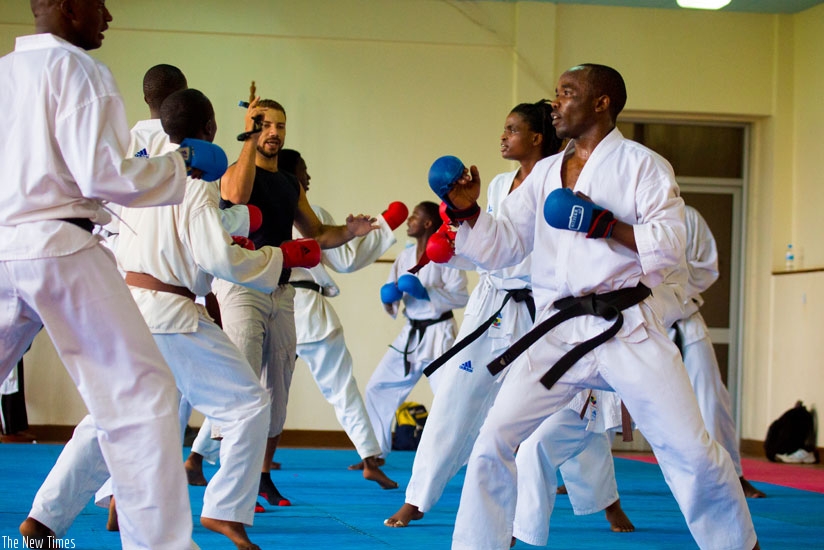When Rwanda's Karatekas headed to Congo-Brazzaville on September 2, they were upbeat. Winning big was on their mind and they looked to make history at this year’s All African Games.


When Rwanda's Karatekas headed to Congo-Brazzaville on September 2, they were upbeat. Winning big was on their mind and they looked to make history at this year’s All African Games.
For the first time in the team’s history, they trained together for nearly three months and, hopes were high that medals could be grabbed at the highest pinnacle of continental games held every four years – one year before the Olympic Games.
But their opponents too were ready, and in fact, far better prepared. However, the team of seven returned home empty-handed, save for a far better show of force than what transpired at previous games in Maputo, Mozambique, in 2011.
In Maputo, none of the five fighters fielded by Rwanda went past the first match in their respective team and individual weight categories.
But, despite bowing out early, the current team now under the guidance of local coach Noel Nkuranyabahizi, pulled off a string of compelling wins in Brazzaville. Nkuranyabahizi, a former national team player himself, was impressed by their show of character.
Even though hosts Congo won six medals (one gold and five bronze) to end fifth in ranking at the end of the games, at the start, Rehema Kabera, battling in the under 50kg category trounced her Congolese opponent 3-1 before she was eliminated by a Mozambican on 0-1.
At the end of the Karate contest, Algeria, Egypt, Senegal, Cameroon and Congo-Brazzaville, emerged winners in that order.
In the under 68kg category, Solange Ingabire, the other only female on the squad, lost 5-6 and 1-3, first to an Algerian who is a former African champion and then an Egyptian, in her first and second matches respectively.
The men also showed courage as Jean Paul Shyirambere first trounced a Mozambican opponent 5-1 but later lost 1-8 against a South African.
Jean d’Amour Rukundo knocked out Seychelles rivals 8-0 but lost against an Egyptian. Christian Rurangayire first trounced a DR Congolese opponent 4-0 but lost 0-3 to an opponent from Congo-Brazzaville and 1-5 to an Algerian.
Coach Nkuranyabahizi, who returned home with a level 1 World Karate Federation (WKF) coaching certificate after passing his coaching examination, later told Saturday Sport that "our team did the maximum it could but it lacked enough preparation for such a top level competition.”
The team had started training for the games in June. But last year, Tamer Abdel-Raouf, an Egyptian Karate coach and former Egypt national champion, who briefly trained the Rwandan national team, told this paper that back in his native home, athletes are prepared 12 months before a major tournament.
The Egyptian said: "In Egypt, we have won many medals but we start preparing for a championship one year before it begins.”
According to Nkuranyabahizi, enough preparation also entails friendly matches at a top level because "testing ourselves against regional opponents yet we are better than them is not good enough.”
"The countries that won medals have invested significantly in the sport. An example is Congo Brazzaville which has participated in many international competitions, its players have training camps in Europe and are professionals,” Nkuranyabahizi said.
Nkuranyabahizi believes that is important to increase the number of local referees and coaches and they must attend international training events especially because rules of the game change gradually and "if we are not well updated our players might be defeated, sometimes on technicalities that we don’t understand.”
Better, bigger than us
In retrospect, team captain Vanily Ngarambe, 22, who was eliminated by Congo-Brazzaville’s Adonai Mayinguidi admitted that the Central African nation’s team is better than Rwanda’s because they have many professionals; many good coaches.
Ngarambe said: "Congo has a very big team. They compete to get the best athletes who represent the country. In short, they adopted the Egyptian system. And, for that to happen, there is serious motivation too in terms of all requirements including money.”
"Here, it is different. For example, a player is often competing against one player, or none, to make the national team. Again, we struggle to play karate and do not enjoy it like the Congolese do. Even though things are getting better little by little, we still have a long way to go if we are to catch up with them.”
When Ngarambe’s team set off for Brazzaville, there was only one official – the coach. That in itself is another critical problem.
During matches a fighter is usually aided by a coach standing on the edge of the Tatami (fighting mat) and there are usually more than one fights going on at the same time during big tournaments.
Players often lose simply because they were not assisted and Rwanda suffered the same fate in Brazzaville.
Even during normal training camps, back at home, the country lacks professional coaches capable of handling the various aspects of the martial arts sports.
"Unlike our opponents who have many and more competent coaches, for us we have one coach who juggles Kumite, Kata, men, and women training.
This single coach is also the team psychologist and at times is also in charge of the team’s logistics and acts as team doctor. Imagine that. Clearly, no single area can go well when he handles all these things alone,” Ngarambe lamented.
In a nutshell, the conspicuous lack of sufficient funds which hinder the Rwanda Karate Federation (FERWAKA) in the past; consistent lack of big game experience for the young and eager but largely untested fighters; and poor management, if un-cracked, will continue to ruin Rwanda Karate’s chances in international contests.


